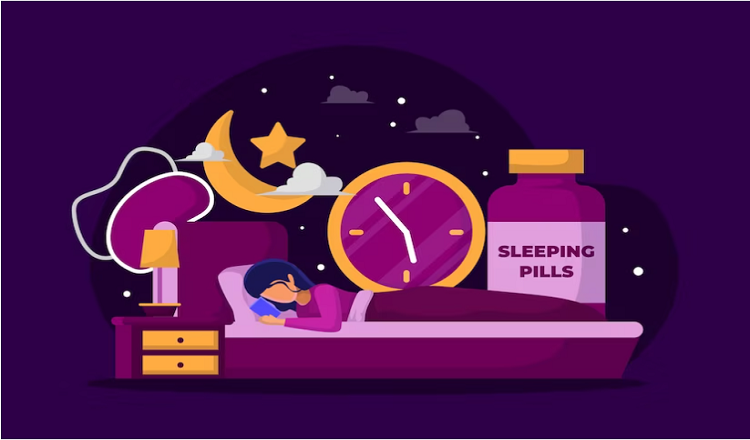
Sleep is a basic biological requirement that is essential for preserving health and general wellbeing. But for many people, it might be difficult to obtain a good night’s sleep because of how fast-paced modern life is. It is impossible to overestimate how vital sleep is to general health, and in order to maintain good health, it is crucial to understand how these two factors interact.
We shall examine the various effects of sleep on general health and wellbeing in this post. We will examine the complex connection between sleep and general health, from analyzing the advantages of obtaining enough sleep to examining the drawbacks of sleep deprivation. We will also highlight some of the most prevalent sleep issues and offer helpful advice on how to increase the quality and amount of your sleep. Therefore, if you’re eager to learn more about the intriguing realm of sleep and how it affects your general health, keep reading!
Research on Sleep
A restful night’s sleep is crucial for preserving general health and wellbeing. All of us understand the need of getting adequate sleep, but many of us are not aware of the science behind it. Light sleep, deep sleep, and REM (rapid eye movement) sleep are among the several stages of sleep. Every stage is crucial to our overall physical and emotional well-being.
Our bodies need light sleep to unwind and prepare for deeper sleep. Light sleep takes place in the early phases of the sleep cycle. Since it strengthens the immune system, promotes the production of growth hormones, and assists in the regeneration of muscles and tissues, deep sleep is crucial for physical restoration and recovery. We have vivid dreams and process emotions during REM sleep, which is essential for cognitive and emotional health.
The circadian rhythm, or natural sleep-wake cycle, of the body, is another important factor in controlling sleep. We experience alertness during the day and sleepiness at night because of our internal biological clock. Our overall health and the quality of our sleep can suffer from breaking this routine.
The Advantages of Sleep for Health
It’s critical to our general health and wellbeing that we get enough sleep. In actuality, the advantages of getting enough sleep go beyond simply waking up relaxed and renewed. We will examine the several health advantages of obtaining adequate sleep in this section.
First of all, sleep is essential for maintaining our mental wellness. Insufficient sleep can cause irritation, mood fluctuations, and problems with focus and memory. On the other hand, getting enough sleep can help us feel better, perform more cognitively, and even lower our chance of acquiring mental health conditions like anxiety and depression.
Sleep has various positive effects on physical health in addition to its effects on mental health. The improvement of cardiovascular health, including lowered blood pressure and a lower risk of heart disease, has been associated with getting enough sleep. In addition to allowing the body to heal and renew, sleep also aids in the body’s ability to fend against diseases and infections. Overall, ensuring that you receive sufficient sleep each night can significantly improve your health and wellbeing.
The Effects of Lack of Sleep
Lack of sleep can have major negative effects on our physical and mental health because it is crucial for overall wellbeing. We’ll talk about the effects of lack of sleep in this article.
First of all, chronic disorders including obesity, diabetes, and hypertension have all been connected to sleep deprivation. Lack of sleep can cause cravings for high-calorie, high-fat foods to grow, which can contribute to weight gain and obesity. In addition, a lack of sleep might increase insulin resistance, which raises the chance of developing diabetes. Additionally, a lack of sleep has been associated with high blood pressure, which increases the risk of heart disease and stroke.
Second, lack of sleep can have a serious effect on our mental health. Studies have shown that getting too little sleep might make depression and anxiety symptoms worse. Additionally, it may change our attitude, making us angrier and more easily upset.
Overall, it is imperative to give sleep first priority and receive the seven to nine hours per night that are suggested. By doing this, we can lower our risk of getting chronic illnesses and enhance our mental health.
Typical Sleep Disorders
In the US, sleep disturbances are a widespread problem that impact many people. Some of the most common sleep disorders include insomnia, sleep apnea, and restless legs syndrome. Sleep apnea is a disorder in which breathing repeatedly stops and resumes while you are asleep, whereas insomnia is defined by difficulties falling or staying asleep. The symptoms of restless leg syndrome include the impulse to move the legs, which can keep people awake at night.
These illnesses have a variety of causes, including both underlying medical issues and lifestyle choices. Medication, therapy, and lifestyle modifications are all possible treatment options. It’s critical to get treatment for sleep disorders in order to maintain general health and wellbeing because untreated sleep disorders can have a variety of detrimental effects. People can improve their sleep and general health by learning about the origins, symptoms, and available treatments for these widespread sleep disorders.
Guidelines for Better Sleep
A restful night’s sleep is crucial for preserving general health and wellbeing. Unfortunately, a lot of people have trouble obtaining enough sleep. Fortunately, there are numerous techniques that can assist enhance the quality of sleep.
We will talk about suggestions for getting better sleep in this article. We’ll start by describing easy lifestyle modifications, including establishing a regular sleep pattern and limiting screen time before bed. We will also look at the advantages of relaxation exercises like yoga and meditation for enhancing sleep. These techniques have been demonstrated to encourage relaxation and lower stress, making it simpler to get to sleep and stay asleep. You may enhance the quality of your sleep and enjoy the many advantages of getting a good night’s rest by adopting these suggestions into your daily routine.
Conclusion
In conclusion, getting enough sleep is crucial for general health and happiness. While sleep deprivation can have a number of negative effects, getting enough sleep is essential for sustaining both physical and mental health. People can make positive changes to their sleep habits and enhance their general health by having a greater understanding of the science of sleep, the health benefits of sleep, typical sleep problems, and recommendations for achieving better sleep.
By setting a regular sleep schedule, creating a sleep-friendly environment, limiting technology use before bed, and taking into account relaxation methods like yoga or meditation, it is crucial to prioritize excellent sleep hygiene. People in the USA can lower their chance of contracting chronic diseases, as well as their mood, cognitive function, and general quality of life, by improving their sleep. Remember that getting enough sleep is crucial for your health, and even tiny adjustments to your sleeping patterns can have a big impact on your happiness.
Read More You May Like:








